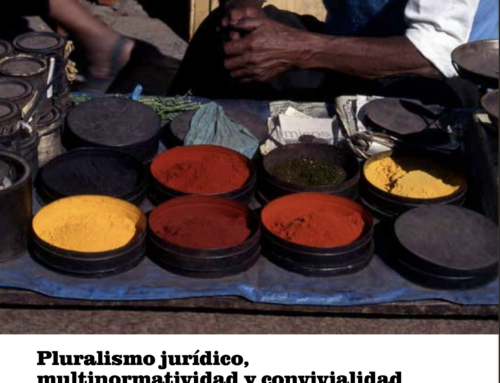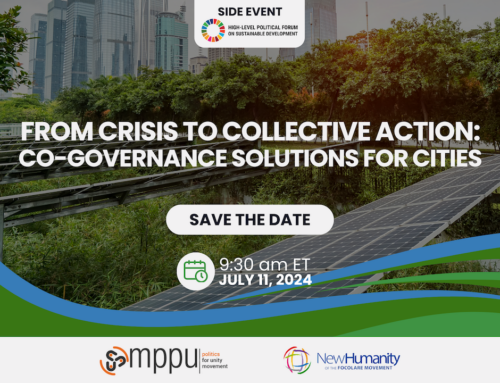| Care can lead to political action. This is the way of doing politics that excites us young people, that makes us approach politics again to take it in our hands and transform it. – Melissa Santos, MPPU International Centre |
Contribution of Melissa Santos
It has been [9] months since the start of the Pathway #daretocare campaign, a new international pathway aimed at training active citizenship and politics for unity. Pathway – “Pathway” in fact means “journey”, with the aim of creating the roots of a new culture and passing on a message of hope to humanity.
And how are we doing this? First of all, it is about giving a soul back to the public sphere, to the exercise of citizenship and political life. That’s why we have chosen this slogan: #DARETOCARE, which invites everyone to have the courage to take care, to take charge in an attentive and caring way of the planet, of future generations, of cities and their institutions, of the others around us, starting with the most fragile…
Every two months we launch a different lesson on the web and in the life of our communities with a video recording, with contributions from various experts who help us apply the paradigm of care to the following political themes: listening and dialogue; equality and equity; fraternity and the common good; participation and co-governance; caring for the planet. These themes are indeed of central importance if we want to work for the transformation of our reality.
If you have been with us since June, you have seen how fruitful this journey has been, which continues with new knowledge and ideas. With each lesson we see new possibilities opening up. This has also been helpful in enriching the meaning of today’s citizenship, which calls for important changes at the social level, from our homes to public administration.
Many of you may ask: “why is this idea of care becoming so important in the cultural and political debate?” and above all: “how can care be applied to politics?”.
“Care” is a word that has a specific force in the social sphere; numerous scholars have already devoted research and programmes to it, placing it at the centre of a new global ethical agenda. To help us understand its importance and its novelty, I give the floor to Daniela Ropelato, a member of the MPPU International Centre, professor of political science at Sophia University and who is also working with the #daretocare project.
Contribution of Daniela Ropelato
This new interest in the theme of care has intrigued many. Some wondered why such a strongly characterised proposal as the idea of care should be placed at the centre of a process of renewal of citizenship and politics.
Our commitment in politics is inspired, as we well know, by an idea, unity, which is guiding us to design a new ‘paradigm’ of thought and action – to use a challenging word – that is also effective in political action. So why this need to give centrality to a new complementary idea, that of care?
As we know, decisions such as these are often not taken around a table: it is rather life, the encounter between people (and the energy of young people!) that guides us. This was also the case this time. Moreover, each time poses different questions and the point of observation we take on also contributes to the production of a new thought. It is this point of view that makes the difference.
The pandemic was the initial context. In this dramatic setting, the distinction emerged first of all between curing – in the predominantly medical sense, ‘to cure’ – and ‘to care’, in the sense of taking care of someone or something. And it is this second meaning – to care – that has helped us to get closer to the dimension of men’s and women’s lives, to their needs, and also to public policies understood as social policies in the broadest sense.
We decided to go down this road and, along the way, we met sociologists, economists and politicians who have been studying these issues for some time, some with a religious approach, others with a secular perspective. Among these fellow travellers was Jennifer Nedelsky, a Canadian [political theorist], who for years has been calling for a new relational human flourishing by combining work, social organisation and care. Her analysis is very interesting: the great inequality in the world of work is also due to a mistaken relationship between the organisation of work and the organisation of care: for thousands of years care was thought of as a gratuitous duty to be carried out inside the home, especially by women, while men were responsible for generating income outside the home. Nedelsky suggests that rethinking care work could lead to an overall reassessment of the social and political system.
More. The dimension of care connects political dimensions that might have seemed disconnected. As Ulrich Beck, a German sociologist, observed as early as 2010, those who fight to protect the environment will manage to save on the cost of medical treatment; those who deal with the risks of technology in good time will not have to chase after technology or pay compensation at a very high cost, in order to remedy the damage once it has been done. We could say that caring is therefore also about prevention, and that human interdependence is in fact also articulated in the principle of care.
Another scholar, Elena Pulcini, an Italian philosopher, explains the idea of care starting from the mutual and inter-generational responsibility that binds us. Because looking at reality with a view of care makes us discover that we are vulnerable and, for this very reason, responsible for each other; and reciprocal care becomes a form of life, a concrete commitment and an affective dimension, concerned for the other and in solidarity. Mutual care therefore no longer appears to be merely an additional, optional dimension of politics: it becomes its essence.
To put it another way, deepening the principle of care has been like opening a series of windows, taking on new tools in the face of the pain and questions of so many brothers and sisters. Today we feel we can say that politics can no longer be understood without this dimension of solicitude and sharing, of effective service and support, of participation.
And finding ourselves alongside friends, rich in new thinking, has confirmed once again that it is part of the path of unity to walk the road together, bringing out all the signs of good that surround us. After all, the first objective of the Pathway is always, first and foremost, to network, to have a greater and better impact on society.
For our part, fraternity, the “global paradigm of political development”, as Chiara Lubich defined it in 2003, remains an essential feature of political action in this changing era. And Pope Francis also says so in his latest encyclical, Fratelli tutti. Only fraternity is the regulating and transparent principle also of caring, overcoming the antagonistic conceptions of politics, continuously opening relationships and institutions, in negotiation and conflict resolution, composing the different partialities in the unity of a design of good for all. But this is a chapter that continues…





Leave A Comment